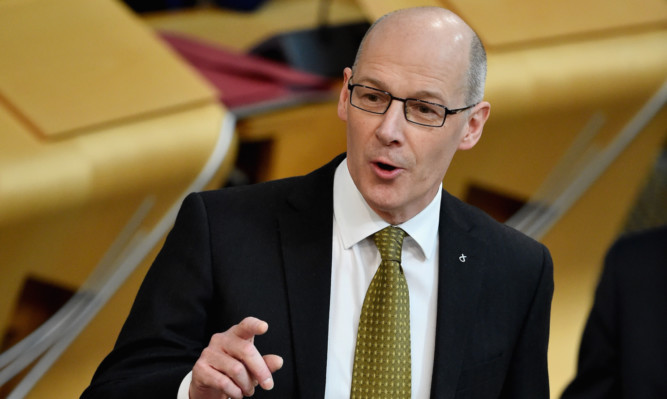Back in 1999, the night before it was announced, John Swinney was bounced into accepting the “Penny For Scotland” policy.
He’d been against it all along and it was assumed no party would use the Tartan Tax that had been created for the new parliament in Edinburgh.
Alex Salmond changed that.
Faced with a popular UK government lead by Tony Blair and the thrill of Scotland’s first-ever devolved elections, the SNP leader felt his party needed a hook for voters.
So he promised to raise tax if elected. This volte face met resistance Swinney didn’t like being the front man for a U-turn but caved in.
It was rushed the day it was announced there was still no clear plan how the money would be spent. I think it only acquired the moniker “Penny for Scotland” later.
Certainly, the idea that it would buy hospital beds and MRI scans came days afterwards.
Opinion is divided among those in the room as to whether 1999 was a successful campaign for the SNP.
The tax policy didn’t shift the party’s standing in opinion polls. The final tally of 35 MSPs seemed low but is more than Labour are expected to win in 2016.
It tarred the party with the idea of being tax-and-spenders, which some feel damaged its prospects for next few years. Lord knows the emotional price paid by Swinney, twisted every which way by the political winds.
Wrong side?
Once decided upon, the party faithful were issued briefing sheets and sent off to sell the idea just as this year they have been issued bullet points to attack Labour’s plan to raise income tax by a penny. The trouble is, it feels this time that the party faithful are fighting on the wrong side.
Politics requires difference. In Scottish politics this has been absent for a long time.
The constitution aside, our main parties are interchangeable on most issues. By arguing for a hike of 1p on the income tax rates, Labour has created meaningful difference, as Alex Salmond hoped to in 1999.
The matter is unlikely to change the election result if the pollsters are right, the SNP majority is too big for a reverse.
Short of Nicola Sturgeon declaring undying love for Nigel Farage or Angus Robertson declaring war on Pimlico, there’s little that can dent their lead.
The Labour party will still lose, then but go into the next parliament buoyed by a good policy rammy which plays to its natural instincts.
Further, they have defined the election campaign in their favour they appear the good guys.
It’s also good for the Tories should they suggest a tax cut then, for the first time in decades, Scottish voters will have a real choice when it comes to who is best to look after public services.
The opposition parties have little to lose and a lot to gain in credibility terms. The risk lies with the governing party.
If you spend your life shouting “fire, fire”, at some point you have to use the extinguisher. If not, then you just look like an arsonist.
That’s the SNP’s problem they have built popularity on the idea that flaming cuts are licking across the border and only they can fight the inferno but they refuse to hit the sprinklers, in the form of a tax rise.
The SNP’s problem is that they voted for this mechanism it was part of the 2012 Scotland Act approved unanimously by Holyrood and poor old John Swinney is on record as saying the tax is progressive.
Nobody could say it is an elegant tax affecting the three bands of income tax uniformly does seem perverse but equally, it’s not the basket case it is now presented as.
It is inarguable that more you earn, the more tax you will pay.
The SNP’s objection is political (they think low tax and competence wins every time and that’s what counts) but have constructed a defence around how the tax will affect the lowest paid.
Rules of spin
It fails the first rule of spin, that the argument must be simple. Instead, it relies on an interpretation of percentage points, which is dull and tricksy.
They have quite possibly leapt too soon.
With Labour and the Liberal Democrats both arguing for use of the tax and the Greens no doubt not far behind, the SNP could simply have decided upon the same policy.
Then the opposition’s difference is gone while public services are actively defended.
Signing up to a penny rise in tax may scare those Tories disguised in the SNP’s Business for Scotland wing back to the Conservatives but the rest of Scotland would have been left with the same choice they had before tax was mentioned who looks most competent.
By arguing against the new “Penny for Scotland” tax, the SNP risk appearing as if they are arguing against the nation not a good place for a nationalist party to be.
Then again, could John Swinney’s heart cope with yet another twist?
